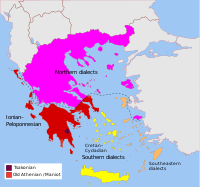Languages of Greece
| Languages of Greece | |
|---|---|
| Official | Greek (Demotic) |
| Regional | Cretan, Cappadocian, Pontic, Maniot, Thracian, Tsakonian, Yevanic |
| Minority | Albanian, Turkish, Russian, Romani, Bulgarian, Macedonian, Armenian |
| Foreign | English (51%)[1] German (9%) French (8.5%) Italian (8%) |
| Signed | Greek Sign Language |
| Keyboard layout | |
| Source | European Commission[2] |
| Part of a series on the |
| Culture of Greece |
|---|
 |
| People |
| Languages |
|
Mythology |
| Cuisine |
| Festivals |
|
Art |
The official language of Greece is Greek, spoken by 99% of the population. In addition, a number of non-official, minority languages and some Greek dialects are spoken as well. The most common foreign languages learned by Greeks are English, German, French and Italian.
Modern Greek

Cappadocian Greek
Cappadocian Greek (Καππαδοκικά) is a Hellenic language originally spoken in Cappadocia and since the 1920s spoken in Greece. It has very few speakers and was previously thought to be extinct. The Cappadocians rapidly shifted to Standard Modern Greek and their language was thought to be extinct since the 1960s.
Cretan Greek
Cypriot Greek
Cypriot Greek (Κυπριακή διάλεκτος) is spoken by Greek Cypriots. In Cyprus about 659,115 (in 2011) spoke the language, and many of them settled in Greek cities. The language is prevalent in many other parts of the world including Australia, Canada and the Americas. The total speakers are about 1.20 million people.
Maniot Greek
The Maniot Greek dialect (Μανιάτικη διάλεκτος) of the local area of Mani.
Pontic Greek
Thracian Greek
The Thracian Greek dialect is spoken mainly in Western Thrace and by the Greek minority in other areas of Thrace outside the Greek borders, and by greek refugees who came from East Thrace in Macedonia mainly
Sarakatsanika
An archaic dialect of Greek spoken by the
Tsakonian Greek
The little-spoken Tsakonian language (Τσακωνική διάλεκτος) is used by some in the Tsakonia region of Peloponnese. The language is split into three dialects: Northern, Southern, and Propontis. The language is spoken by 1,200 people.
Yevanic Greek
A
Greek Sign Language
Greek Sign Language (Ελληνική Νοηματική Γλώσσα) is the sign language of the Greek deaf community. It has been legally recognised as the official language of the Deaf Community in Greece and is estimated to be used by about 42,000 signers (12,000 children and 30,000 active adult users) in 1986.
Minority languages

Albanian
Since the 1990s, large numbers of Albanian immigrants have arrived in Greece, forming the largest immigrant group (443,550 in the 2001 census). Due to immigration, Albanian is considered as one of the widely spoken foreign languages in the country.
Arvanitika
Unlike the recent immigrants from Albania, the Arvanites are a centuries-old local Albanian-speaking Greek community, from the area today South Albania, living in parts of Greece especially in the south. Their language, now in danger of extinction, is known as Arvanitika. Their number has been estimated as between 30,000 and 140,000. Many have been assimilated into modern Greek culture.
Armenian
Of the 35,000 Armenians in Greece today, some 20,000 speak the language.[citation needed][year needed]
Aromanian

The
Megleno-Romanian
Megleno-Romanian is a Romance language spoken in Greece and North Macedonia. There are roughly 2,500 speakers in Greece.
Macedonian
In Greece,
Bulgarian
In addition to the above, there are an estimated 30,000 native speakers of Bulgarian in Western Thrace according to Ethnologue,[6] where it is referred to as Pomak.
Ladino
Romani
In the population of 200,000 to 300,000
Russian
Turkish
Turkish is one of the most widely spoken minority languages in Greece today, with approximately 50,000 to 60,000 speakers. Turkish sources claim that as many as 128,000 people consist the minority group, but this is unlikely. According to Ethnologue, in 2014 there were 40,000 Turkish speakers in Greece, including 9,700 native speakers.[9]
These are usually defined as
Greco-Turkic or Urum
This refers to the hybrid Greco-Turkish dialect spoken by the so-called
Georgian
References
- ^ "SPECIAL EUROBAROMETER 386 Europeans and their Languages" (PDF). ec.europa.eu. Archived from the original (PDF) on 2016-01-06.
- ^ Europeans and their Languages
- ^ cia.gov
- ^ etchnologue.com Euromosaic, Le (slavo)macédonien / bulgare en Grèce, L'arvanite / albanais en Grèce, Le valaque/aromoune-aroumane en Grèce, and Mercator-Education: European Network for Regional or Minority Languages and Education, The Turkish language in education in Greece. cf. also P. Trudgill, "Greece and European Turkey: From Religious to Linguistic Identity", in S Barbour, C Carmichael (eds.), Language and nationalism in Europe, Oxford University Press 2000.
- ^ dev.eurac.edu Archived 2003-05-23 at the Wayback Machine
- ^ ethnologue.com
- ^ jmth.gr Archived 2008-12-26 at the Wayback Machine
- ^ romani.uni-graz.at
- ^ Greece - Languages, Ethnologue
![]() This article incorporates public domain material from The World Factbook (2024 ed.).
This article incorporates public domain material from The World Factbook (2024 ed.).

